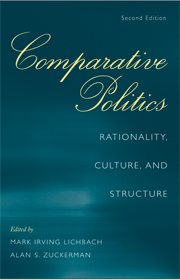Book contents
- Frontmatter
- Contents
- Contributors
- Preface and Acknowledgments
- 1 PARADIGMS AND PRAGMATISM
- 2 THINKING AND WORKING IN THE MIDST OF THINGS
- 3 ADVANCING EXPLANATION IN COMPARATIVE POLITICS
- 4 STRONG THEORY, COMPLEX HISTORY
- 5 RECONSIDERATIONS OF RATIONAL CHOICE IN COMPARATIVE AND HISTORICAL ANALYSIS
- 6 CULTURE IN COMPARATIVE POLITICAL ANALYSIS
- 7 RESEARCHING THE STATE
- 8 AN APPROACH TO COMPARATIVE ANALYSIS OR A SUBFIELD WITHIN A SUBFIELD?
- 9 THE GLOBAL CONTEXT OF COMPARATIVE POLITICS
- 10 COMPARATIVE PERSPECTIVES ON CONTENTIOUS POLITICS
- 11 CITIZENSHIP IN DEMOCRATIC POLITICS
- 12 NESTED CITIZENS
- 13 BACK TO THE FUTURE
- 14 THE COMPARATIVE POLITICAL ECONOMY OF THE WELFARE STATE
- 15 MAKING CAUSAL CLAIMS ABOUT THE EFFECT OF “ETHNICITY”
- References
- Author Index
- Subject Index
- Titles in the series
12 - NESTED CITIZENS
MACROPOLITICS AND MICROBEHAVIOR IN COMPARATIVE POLITICS
Published online by Cambridge University Press: 05 June 2012
- Frontmatter
- Contents
- Contributors
- Preface and Acknowledgments
- 1 PARADIGMS AND PRAGMATISM
- 2 THINKING AND WORKING IN THE MIDST OF THINGS
- 3 ADVANCING EXPLANATION IN COMPARATIVE POLITICS
- 4 STRONG THEORY, COMPLEX HISTORY
- 5 RECONSIDERATIONS OF RATIONAL CHOICE IN COMPARATIVE AND HISTORICAL ANALYSIS
- 6 CULTURE IN COMPARATIVE POLITICAL ANALYSIS
- 7 RESEARCHING THE STATE
- 8 AN APPROACH TO COMPARATIVE ANALYSIS OR A SUBFIELD WITHIN A SUBFIELD?
- 9 THE GLOBAL CONTEXT OF COMPARATIVE POLITICS
- 10 COMPARATIVE PERSPECTIVES ON CONTENTIOUS POLITICS
- 11 CITIZENSHIP IN DEMOCRATIC POLITICS
- 12 NESTED CITIZENS
- 13 BACK TO THE FUTURE
- 14 THE COMPARATIVE POLITICAL ECONOMY OF THE WELFARE STATE
- 15 MAKING CAUSAL CLAIMS ABOUT THE EFFECT OF “ETHNICITY”
- References
- Author Index
- Subject Index
- Titles in the series
Summary
The focus in the behavioral study of politics is on individuals. As a subfield of political science, it examines actions (e.g., voting and protest) as well as cognitions (perceptions, attitudes, and beliefs); and as a subfield of comparative politics, it examines them in one, several, or many different countries. It encompasses the study of both cognition and action, in large part because we have long believed that attitudes and beliefs explain action, but also because we are convinced that, in addition to formal institutions or processes, cognitive elements of politics such as legitimacy, values, or grievances are important indicators of the quality and nature of democratic and political life.
This chapter reviews the intellectual foundations of the behavioral study of politics, and it does so with an eye to its evolution as a subfield of comparative politics. It also discusses the field's affinities with different theoretical traditions in political science and comparative politics. I discuss both the past and present of how we study comparative mass politics and describe how it has been transformed because of changes in technology and intellectual trends and in reaction to real-world events. I argue that, as a result of these changes, the study of mass politics has become more central to the study of comparative politics through its ecumenical relations with different theoretical traditions in the social sciences and comparative politics.
MIXED ANCESTRY: ORIGINS OF RESEARCH ON COMPARATIVE MASS POLITICS
Two intellectual projects underlie the comparative study of behavioral politics.
- Type
- Chapter
- Information
- Comparative PoliticsRationality, Culture, and Structure, pp. 314 - 332Publisher: Cambridge University PressPrint publication year: 2009
- 2
- Cited by



